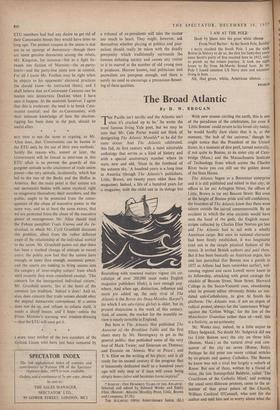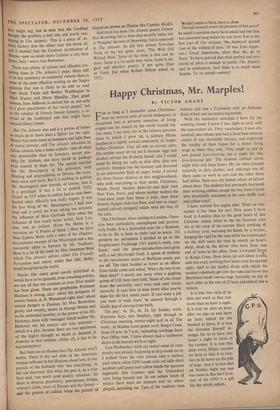The. Broad Atlantic
By- D. W. BROGAN `THE Pacific isn't terrific and the Atlantic isn't I what it's cracked up to be.' So wrote the most' famous living Yale poet, but we may be sure that Mr. Cole Porter would not think of denigrating The Atlantic Monthly* as he did the mere ocean. And The Atlantic celebrated, this fall, its first century with a most admirable anthology that serves as a kind of history and with a special anniversary number where its stars, new and old, 'blaze in the forehead of the autumn sky.' A. hundred years is a long time in America (though The Atlantic's publishers-, Little, Brown, are twenty years older than the magazine). Indeed, a life of a hundred years for a magazine, with the child not in its dotage but flourishing with renewed mature vigour (its cir- culation of over' 200,000 must make English magazine publishers blink), is rare enough any- where.. And ..when age, distinction, influence and merit are added up, the only rival of The Atlantic is the Revue des Deux-Mondes. Harper's (to which I am adscriptus glebes) is older, but its present distinction is the work of this century. And, .of course, the market for the monthly re- view is nearly invisible in England.
But here is The Atlantic that published The Autocrat of the Breakfast Table and the first short story by Mr. Hemingway to get to the general public; that published some of the very best of Mark Twain; and Emerson on Thoreau; and Einstein on 'Atomic War or Peace'; and T. S. Eliot on the writing of his plays; and is all ready for• its second century if the progress that it 'innocently dedicated itself to a hundred years ago will only stop or if man will cease being simply homo Faber and becomes homo sapiens:"
* JUBILEE : ONE HUNDRED YEARS OF THE ATLANTIC.
Selected and edited by. Edward Weeks and Emily Flint. (Boston : Atlantic Monthly Press, Little, Brown and Company, $7.50.)
THE ATLANTIC 100TH ANNIVERSARY ISSUE. ($1.)
With new moons circling the earth, this is one of the paradoxes of the celebration, for even if `Little Boston' could return to his loved city today, he would hardly dare claim that it is, at the moment, 'the hub of the universe,' though he might notice that the President of the United States, in a moment of dire peril, turned naturally, if not quite to Boston, to its sister city of Cam- bridge (Mass.) and the Massachusetts Institute of Technology from which across the Charles River basin you can still see the golden dome of the State House.
The Atlantic began as a Bostonian enterprise and it is still published and edited in that city; its offices in (or on) Arlington Street, the offices of Little, Brown in (or on) Beacon Street. But even at the height of Boston pride and self-confidence, the founders of The Atlantic knew that there were talents outside the sacred commonwealth. By an accident in which the wise ancients would have seen the hand of the gods, the English manu- scripts collected by Charles Eliot Norton got lost and The Atlantic had to sail with a wholly American cargo. But once its national character had been firmly established, it was hospitable (and not in the simple piratical fashion of the times). It invited British authors and paid them. But it has been basically an American organ, less and less parochial (for Boston was a parish in .1857,as Athens had been somewhat earlier), wel- coming regions- and races Lowell never knew to its fellowship, attacking with great courage the citadels of Beacon Street, State Street, Harvard College in the Sacco-Vanzetti case, abandoning what its present editor obviously thinks an out- dated anti-Catholicism, to give Al Smith his platform. The Atlantic was, if not an organ of .radical protest, always for the 'conscience Whigs' against the 'Cotton Whigs,' for the line of the Manchester Guardian rather than of—well, this is a festivity, so no acrimony.
Mr. Weeks May, indeed, be a little unjust to Ellery Sedgwick. No doubt Mr. Sedgwick did see (as Little Boston saw) the city on three hills (Boston, Mass.) as the natural rival and con- queror of the city on seven (Rome, Italy). Perhaps he did print too many critical articles by ex-priests and queasy Catholics. The Boston he knew was not a rival but largely a suburb of Rome. But one of them, written by a friend of mine, the late Summerfield Baldwin, 'called 'The Crucifixion of the Catholic Mind,' and evoking the usual semi-illiterate protests, came to the at- tention' of that great prince of the Church, William Cardinal O'Connell, who sent for the author and told him not to worry about what the laity :night say, but to note that the Cardinal _th_ought the problem a real one and worth ven- tilating in The Atlantic. This is a piece of At- lantic history that the editor may not know of, and it showed that the Cardinal Archbishop of Boston—now so much more Catholic a city than Rome, Italy—was a true Bostonian.
There was plenty of urbane and effective cru- sading done in The Atlantic's page; there still Is. In this centenary or centennial volume there is Some of the most effective writing on the Negro question that one is likely to be able to read fromMark Twain and Booker Washington to thel Waters and Oscar Handlin. That great Woman, Jane Addams, is revived for us, not only as a great practitioner of the 'social gospel,' but as the rebuker of French female fanatics, a re- versal of the traditional role that might have amused Henry James.
But The Atlantic was and is a patron of letters as much as or more than a fighter for the right. Boston had more need of sweetness and light than of moral fervour, and The Atlantic educated its fellow citizens into a more catholic view of what Was permissible than its founders, except pos- sibly Dr. Holmes, can have dared or perhaps even wanted to hope for. The special number has Mr. Hemingway at his grimmest, with blinding and emasculation as themes, the treat- ment stern and stark. But it is nothing to publish Mr. Hemingway now (except, of course, that it is a privilege). It was a lot to publish 'Fifty Grand' in 1927 when its author had in vain bom- barded other officially less stuffy organs. It was the first thing of Mr. Hemingway's I had ever read and it saved me from taking too seriously the influence of Miss Gertrude Stein when the influence of that much better writer, Jack Lon- don, was so evident. (Even the theme is a variation on 'A Pound of Steak.') Here we have Miss Eudora Welty with a story of the alligator- encumbered swamps of the. Mississippi and a less successful effort in humour by Mr. Faulkner. Here is a bit of the book by Miss Jessamyn West which The Atlantic editors called The Friendly Persuasion and which, under that title, Holly- wood has given to the world.
Stories (the many good novels published as serials have to be ignored), even crusading articles, are not all that the constant or even fitful reader has been given. There are prophecies. Professor Haldane is wrong, alas! about the prospects of atomic fission, A. N. Whitehead right, alas! about certain dangers in Zionism. Sir Max Beerbohm, gently and sweetly, shows us George Moore and in the centennial number, in the person of his Mr. Hethway, deals with 'messages' which neither Mr. Hethway nor his creator can take seriously— which is a pity, because there are two specimens of the higher thought so much in demand in America in that number. (After all, it has to be representative.) But there are no themes that The Atlantic won't tackle. There is the sad state of the American woman reflected in her illusions about love, in her pursuit of the husband who 'has everything,' in her sad discovery that what she gets is, as a wise Scot said, `too much poor quality attention.' So there is divorce, psychiatry, peevishness, bridge, women's clubs, tours of Europe and the Orient— and the pursuit of culture when the pursuit of And there has been The Atlantic poetry. I know that Browning isn't a blue-chip security today nor is 'Prospice' the best of Browning, but it appeared in The Atlantic. So did that almost first-class Yeats of the last great years, 'The Wild Old Wicked Man.' Some of the verse is that and no more. Some is a lot more than verse. Some is ele- gant and effective poetry, if not quite Eliot or Yeats. For when Robert Hillyer asked, in 1952: Would I return to Paris, there to chase Through haunted streets the phantom of lost grace? he asked a question many have asked and one that was answered long before he was born. For in the first year of The Atlantic, 'the Autocrat' quoted 'one of the wittiest of men.' (It was Tom Apple- ton.) `Good Americans, when they die, go to Paris.' To have printed that most perfect and pro- found of jokes is enough to justify The Atlantic and its celebration. And there is so much more besides. To its second century!



































 Previous page
Previous page